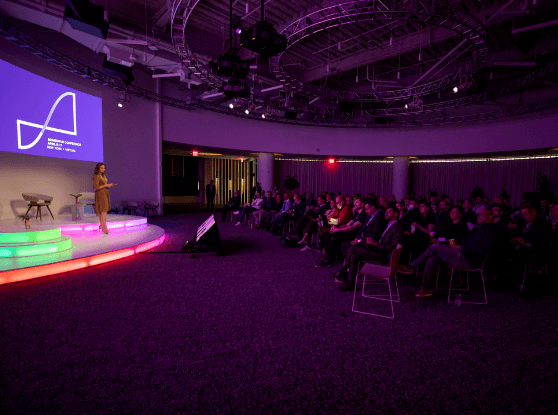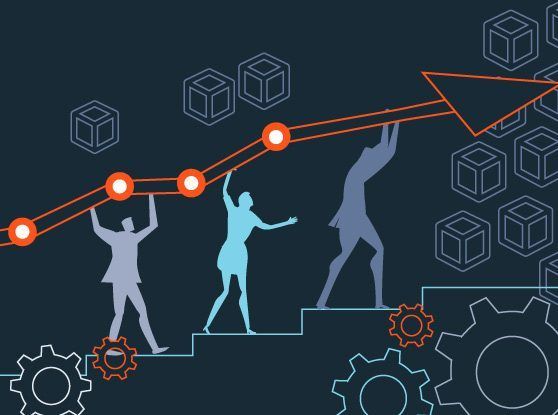
Last week, Insight Partners had the pleasure of hosting over 1,700 individuals at ScaleUp: AI, our inaugural hybrid ScaleUp event bringing together the foremost thinkers, users, doers, innovators, and investors in the domains of software transforming industries.
Over the past week, I’ve had time to reflect on the ideas and trends that were shared over the course of the jam-packed, two-day event. Here are my three main takeaways:
You need data, data, and… good data
It’s no surprise that data was a central focus of an AI conference: Nearly every ScaleUp session touched on it in some way, with speakers sharing their tips on gathering, cleaning, labeling, or storing it.
One particularly interesting observation came from keynote speaker and Landing.AI CEO Andrew Ng, who predicted an evolution from “model-centric” AI — where practitioners’ time and effort is primarily spent developing algorithms — to “data-centric” AI — where the bulk of effort is focused on building the best possible datasets.
This paradigm switch allows companies to shift from fretting about big data, to focusing on good data, and from only applying AI to massive, billion-dollar projects to being able to utilize it for smaller, more customized tasks.
Data-centric AI is a “promising approach” because it allows companies to “provide tools to help the subject matter experts not engineer the code, but instead engineer the data in a way that lets them express their domain knowledge,” Ng said. Ultimately, this allows “the AI system to more efficiently reach a high level of performance.”
Put another way, this data-centric model is “democratizing access to AI,” according to Ng, because it enables us to build better AI systems for a greater range of problems more quickly and efficiently.
AI has real human impact — in so many different ways
Topics of AI responsibility, explainability, and governance came up time and again during our ScaleUp:AI sessions.
As artificial intelligence infiltrates every industry, it creates an enormous human impact, both through the outcomes of AI systems as well as on how people work.
Whether used in healthcare to discover new drugs, human resources to help source the right candidates for a job, or the financial sector to mitigate lending risks, AI systems can shape society and people’s lives.
The stakes are high, as Asmau Ahmed, senior executive at Alphabet’s moonshot lab X, succinctly put it: “Machine learning and AI are either significantly widening the equity gap or if we make the right decisions, significantly closing the equity gap.”
She and other speakers shared their experiences weeding out data bias, eliminating “black box” systems, grappling with the thorny questions that can come up when creating and implementing guardrails, and more.
While their insights are worth listening to in-full, the high-level takeaway is that AI systems need to be well-designed and rigorously monitored to ensure fair, trust-worthy outputs, which is crucial not only for society, but also for business success as well.
“Responsible AI is profitable AI,” said Manoj Saxena, executive chairman of the Responsible AI Institute, adding that, “It's not enough to talk about responsibility as ‘feel good’ stuff: You’ve got to convert it into hard numbers that a board and the CEO can relate to.”
On the other side of the human equation is the way that knowledgeable workers are so integral to successful AI deployment. Many of our speakers and panelists explained why we should think about AI not as replacing human intelligence, but augmenting it, and how people will remain in the loop in most AI systems, to provide quality assurance, flag issues, and handle the long-tail, more complex tasks.
We should view AI as just one more technology tool to help people do their jobs better, according to Insight Partners managing director George Mathew.
“When we look at this great future that we're quickly accelerating towards,” he said, “I believe there's a world where we have machines that assist human beings, supported by artificial intelligence and machine learning, where there's a more moral and a more just way to build a great society, a set of business outcomes, and better communities — together.”
We’re at an inflection point and there’s so much potential
While artificial intelligence has graduated from research labs to real-world deployment and is already driving significant business value at innovative companies, we’re still very much in the early innings.
As Databricks CEO Ali Ghodsi put it: “This is the very, very early days of AI being democratized in all of the software on the planet.”
Speakers like AWS’s Allie K. Miller, P&G’s Vittorio Cretella, DataRobot’s Sirisha Kadamalakalva, FeatureSpace’s Karthik Tadinada, and many more shared their visions for how artificial intelligence will continue to make our lives easier, unlock innovation and business efficiencies, drive competitive advantage, and continue to be more seamlessly integrated into every software solution.
“What does it mean for an AI platform to shift into the background and become line-of-business software that everyone uses?” Tadinada asked.
While we’re still figuring out the answers to queries like that in real-time, ScaleUp:AI was an opportunity to sort through it together. But one thing’s for sure: There’s no question that we’re at an inflection point in AI’s development and the best leaders are charting the path forward.
To dive deeper into all of these big questions and topics — and so many more — visit our ScaleUp:AI website and register for your on-demand pass today to get access to our speaker sessions and masterclasses.










